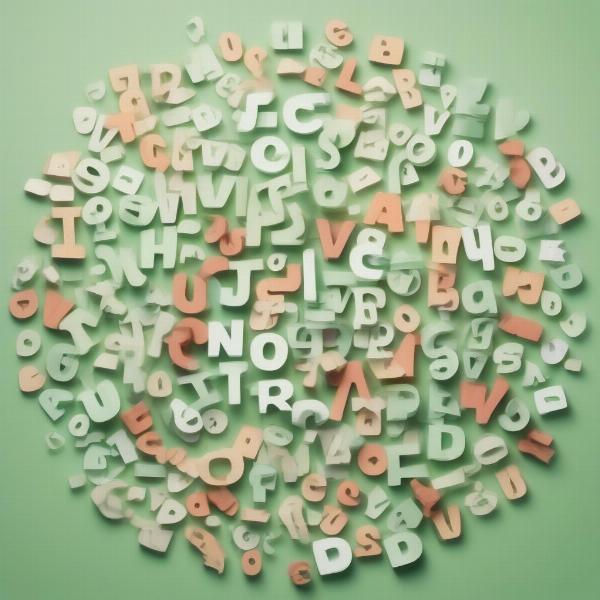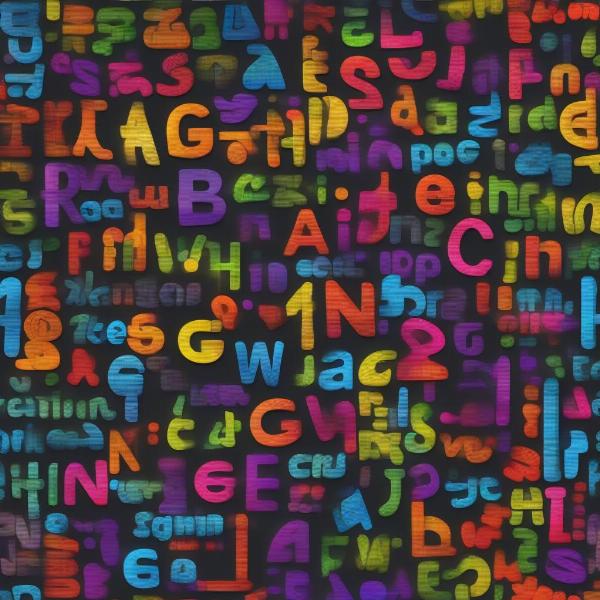Have you ever found yourself staring at a jumble of letters, wondering just how many words you could possibly create? This isn’t just a fun mental exercise; it’s the core concept behind many popular word games and a fantastic way to boost your vocabulary. Here at SupremeDuelist.blog, we love dissecting the mechanics and strategies behind all kinds of games, and today, we’re diving deep into the world of letter-based word-building.
This article will explore the fascinating world of letter games, examining how they work, different variations, and why they are such engaging activities for people of all ages. We will also provide tips and strategies that can help you improve your word-finding abilities.
Understanding the Core Mechanics of Letter-Based Word Games
The basic premise of these games is simple: you’re given a set of letters, and your goal is to form as many valid words as possible. These words can range from simple three-letter words to more complex, longer ones. The challenge lies in recognizing patterns, prefixes, and suffixes within the given letters. Different games may impose additional rules, such as minimum word length or scoring systems based on letter values or word length. Consider this similar to the mental gymnastics involved in other puzzles, such as those that may have a more visual component. It really is a fantastic mental challenge!
These games often test not only your vocabulary but also your ability to think quickly and creatively. They are excellent ways to improve your cognitive function, and in the context of games, they provide both entertainment and mental workout. The beauty of these kinds of games is that they require no special equipment, and can even be enjoyed using simple pen and paper. For some more pen and paper ideas, explore [games you can play with pen and paper].
Types of Letter Games
The variations in letter-based word games are numerous, and each offers a unique twist on the core concept. Here are a few of the most common types:
-
Anagrams: These games present a jumbled word or phrase, and the player needs to unscramble it to form a new word or phrase. For instance, “listen” can be rearranged into “silent”. This style of word game really tests your pattern recognition.
-
Boggle: A grid of letters is presented, and players must find words by connecting adjacent letters. This tests not only vocabulary but also spatial awareness and speed of visual processing.
-
Scrabble: This is a classic board game where players form words on a grid and score points based on the letter values and the position of the word on the board. It adds the strategic layer of board control and point maximisation.
-
Word Searches: While not about making new words, word searches also involve looking at a grid of letters, requiring a keen eye for pattern recognition. You might say, there are similarities with games where [games u can play on paper].
-
Word Jumbles: These games provide scrambled letters, and you have to form one specific word or multiple words of different lengths. These tests of vocabulary and logic are incredibly common in daily puzzles.
 Letter-based word puzzle challenge
Letter-based word puzzle challenge
Strategies for Success in Word Games
Excelling in letter-based word games isn’t just about having a huge vocabulary; it’s also about employing clever strategies. Here are some tips to help you get better at these games:
-
Master Prefixes and Suffixes: Knowing common prefixes and suffixes (e.g., “un-,” “-ing,” “-ed”) can significantly expand the number of words you can form. These letter combinations are very common in English, so this will help quite quickly.
-
Look for Common Vowels: In English, vowels appear very often, so quickly find the vowels in your set of letters, and work around those. This can often be the key to finding many words, quickly.
-
Think Small: Start by finding short, common words (like “a,” “an,” “the,” “is,”). Once you find a few of these, you can use these as building blocks for longer words.
-
Practice Regularly: Like any skill, improving at these games requires practice. Regular play can help train your brain to spot word patterns more quickly.
-
Use Technology: Consider using online anagram solvers and other tools to practice and to learn. These tools can quickly uncover words you might have missed and help you expand your vocabulary. This is a great way to learn more words passively.
“The key to excelling in letter-based word games is not just about the size of your vocabulary, but how quickly you can spot patterns and combinations,” says Dr. Eleanor Vance, a cognitive psychologist specializing in educational games. “Practice and strategic thinking are very important.”
The Psychological Benefits of Letter Games
Beyond being enjoyable and challenging, letter games offer significant psychological benefits. They’re great for exercising your brain, especially for boosting memory and cognitive function. Here’s how they can help:
-
Cognitive Function Improvement: These games require pattern recognition and mental flexibility, which helps keep your brain active and agile.
-
Vocabulary Expansion: By forcing you to use letters in different combinations, you are constantly being exposed to new words and are naturally expanding your vocabulary.
-
Stress Relief: Engaging in a word game can be a relaxing way to unwind and focus your mind on a specific task. This is a form of active relaxation that is great for your well-being.
-
Enhancing Focus: Focusing on word-building activities can help enhance your concentration and ability to pay attention for longer periods. This skill is incredibly important in our distracted world.
 Brain boosting puzzle game letters
Brain boosting puzzle game letters
The Digital Evolution of Letter Games
The digital age has transformed letter games, making them more accessible and interactive. Many apps and online platforms offer a wide range of word games with various features, such as:
-
Multiplayer modes: Compete against friends or other players from around the world. These multiplayer modes can be super engaging and exciting, as well as adding a competitive element.
-
Personalized challenges: Adapt to your skill level and provide new challenges. These modes are great for self-improvement.
-
Real-time score tracking: Keep track of your performance and see how you stack up against others. This provides great feedback.
-
Tutorials and hints: Learn new strategies and get help when you’re stuck. These are excellent resources to learn new methods and words.
-
Social Features: Share your scores, your accomplishments and find new competitors. Online play allows you to meet other players from all over the world.
For those who prefer a less digital approach, you can always enjoy some [games you can play in your head], using only your mind. The options for mental and social games are extensive.
How Many Words Can You Make?
So, how many words can you make with these letters game? The answer depends on the specific set of letters and your skill level. The important thing is to enjoy the process of playing, learning new words and strategies. The act of trying and getting better can be even more rewarding than simply finding the word.
“The beauty of these games lies in their simplicity and the endless possibilities they offer,” adds gaming analyst, Marcus Chen. “They are not just about winning, but about the joy of discovering new words and expanding your linguistic horizons.”
Conclusion
Letter-based word games are more than just a fun way to pass the time; they are powerful tools for cognitive enhancement, vocabulary expansion, and stress reduction. Whether you’re a seasoned word game enthusiast or just starting out, these games have something to offer everyone. At SupremeDuelist.blog, we appreciate the intricate mechanics and psychological benefits of all kinds of games, and hope this deep dive into letter-based games has been informative.
Remember to practice regularly, experiment with new strategies, and never underestimate the power of a good word game. You can also check out [i can play the pen game] for more ideas on word and pen-based games. Happy word hunting!
Leave a Reply